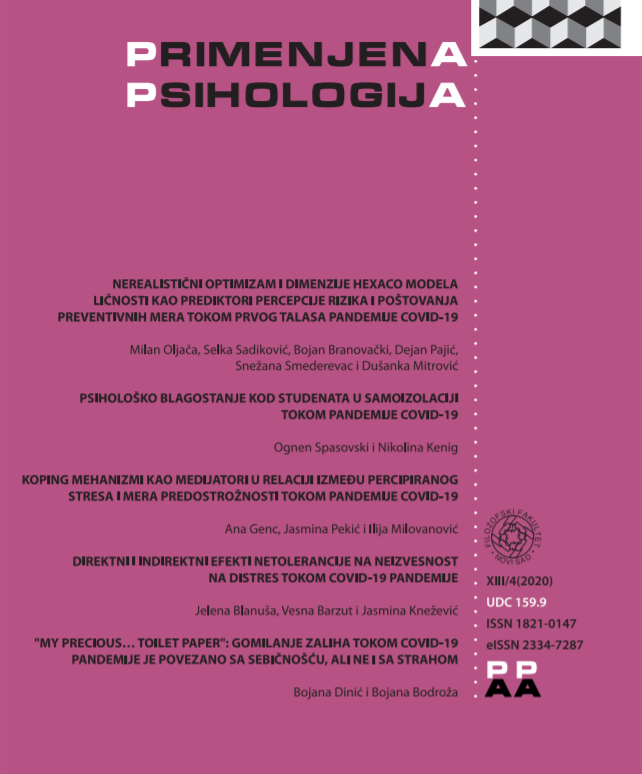COPING MECHANISMS AS MEDIATORS IN THE RELATIONSHIP BETWEEN PERCEIVED STRESS AND PRECAUTIONS DURING THE COVID-19 PANDEMIC
KOPING MEHANIZMI KAO MEDIJATORI U RELACIJI IZMEĐU PERCIPIRANOG STRESA I MERA PREDOSTROŽNOSTI TOKOM PANDEMIJE COVID-19
Author(s): Ana Genc, Jasmina Pekić, Ilija MilovanovićSubject(s): Psychology
Published by: Филозофски факултет, Универзитет у Новом Саду
Keywords: COVID-19; coping mechanisms; precautionary measures; stress perception
Summary/Abstract: The current COVID-19 pandemic represents an accidental crisis of global proportions that requires humanity to adaptively cope with unknown and low-control stressors. This research aimed to explore coping mechanisms by first considering them in the domain of their factor structure and then examining their mediating role in the relationship between stress perception and precautionary measures in the context of a pandemic. The sample included a total of 582 adult re-spondents from Serbia (75.7% female), with an average age of 38.74 years (SD = 10.48). The Brief COPE (Coping Orien-tation to Problems Experienced) scale was used to measure coping mechanisms, the Perceived Stress Scale was used to assess the perception of the stress level, and the propensity to adhere to the prescribed precautions was examined with a scale constructed for the purpose of this study. The exploratory factor analysis extracted seven coping strategies. The first corresponded to problem-focused confrontation, the second referred to emotion-focused confrontation, three isolated dimensions were associated with avoidance coping strategies, while the functions of Humor and Religion could not be clearly defined. After conducting a higher-order factor analysis, two factors were singled out: the first, which combined problem-focused and emotion-focused coping, Humor, and Religion, and the second, which brought together mechanisms aimed at avoidance coping. The results of the hierarchical regression analysis suggested significant partial mediating effects of coping mechanisms. The first higher-order factor enhanced the effects of stress perception on the practice of precautionary behavior, while the second higher-order factor reduced these effects. The obtained results raise the question of adequacy of the standard coping mechanism measuring instruments in the assessment of stress caused by an accidental crisis and further question the possibility of an adequate response to stressors that are unknown and poorly controllable.
Journal: Primenjena psihologija
- Issue Year: 13/2020
- Issue No: 4
- Page Range: 449-471
- Page Count: 22
- Language: English

